Families, Illness, And Disability: An Integrative Treatment Model
By (author): "John S. Rolland"
Publish Date:
January 15th 1994
ISBN0465029159
ISBN139780465029150
AsinFamilies, Illness, And Disability: An Integrative Treatment Model
Original titleFamilies, Illness, and Disability: An Integrative Treatment Model
When a family member is diagnosed with cancer or faces challenges from living with a disability, the impact reverberates throughout the family, leaving no one untouched. How should a clinician help the parents of a child who is critically ill? How can a marital relationship be skewed and a child's well-being compromised when a parent becomes permanently disabled—and how can a clinician best intervene in such cases? In presenting his clinically powerful Family Systems Illness Model, John Rolland addresses these and other vital questions of importance to families in which there is a member with a major illness or disability.Rolland's integrative treatment model is based on his experience with more than five hundred families, first as Founding Director of the Center for Illness in Families while at Yale University and currently at the University of Chicago. He applies it to a broad range of disorders that affect adults and children over the entire course of the life cycle. Richly illustrated with varied case examples, Families, Illness, and Disability is unique in describing this comprehensive model and in providing a highly practical guide to effective intervention.Through a normative, preventive lens, the book's useful framework shows how the biopsychosocial demands of different illness and disabilities create particular strains on the family, how the stages of an illness affect the family, how family legacies of loss and illness shape their coping responses, and how family belief systems play a crucial role in the ability to manage health and illness. Practitioners will learn how to help families live well despite physical limitations and the uncertainties of threatened loss, how to encourage empowering rather than shame-based illness narratives, how to rewrite rigid caregiving scripts, how to encourage intimacy and maximize autonomy for all family members. With its superb integration of individual and family modalities, this outstanding book is ideal for all health and mental health professionals and students who work with illness, disability, and loss in a wide variety of clinical settings.
